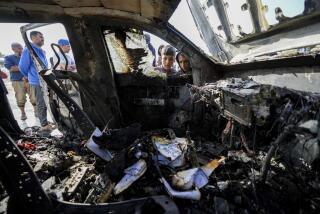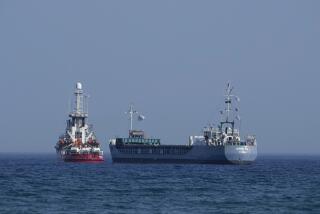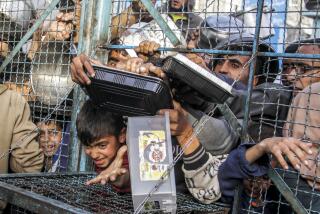Gaza border breached; thousands flood into Egypt
Masked gunmen used explosives to blow holes in the Gaza Strip’s border fence early today, enabling thousands of Palestinians to pour into Egypt to buy food, fuel and other supplies that had been cut off because of an Israeli blockade, witnesses said.
Egyptian and Palestinian border guards did not resist the mass crossing at the Rafah terminal. Witnesses said Palestinian security officials later closed some of the breaches but kept two open, allowing Gazans to cross into Egypt and return with milk, cigarettes and plastic bottles of fuel.
Hundreds of Gaza women had crashed a gate at the same border Tuesday to protest Egypt’s cooperation with Israeli sanctions. They were turned back during a riot that injured 35 people and curtailed a resumption of food aid to the impoverished territory.
Gaza came under total blockade Thursday after a sharp increase in Palestinian rocket attacks against Israel. The attacks continued Tuesday, but at a reduced rate, with more than 20 rockets landing harmlessly.
Israel nonetheless eased the blockade Tuesday by delivering 317,000 gallons of diesel fuel for Gaza’s shut-down power plant and for near-empty backup generators at hospitals. By evening, lights were back on in much of this capital after a two-day blackout.
But the United Nations Relief and Works Agency and the World Food Program said the border disturbance prevented 14 of the 24 truckloads of aid they had dispatched to Gaza from getting in. The two agencies supply food donations to about three-fourths of Gaza’s 1.5 million people.
The trouble started at the Rafah crossing between Gaza and Egypt during a protest organized by the Islamic militant group Hamas. About 400 women chanted accusations against Egyptian President Hosni Mubarak, calling him a coward for sticking to an agreement with the United States and Israel to keep the border closed most of the time and Gaza’s Hamas-led government isolated.
The crowd surged against a tall metal gate and broke through, spilling into a no man’s land between Gaza and Egyptian territory. Demonstrators hurled rocks at Egyptian police officers, who drove them back with clubs, tear gas and water cannons.
Hamas border guards waded into the crowd to help restore calm. But their warning shots appeared to inflame the situation, prompting Egyptian police to start shooting too.
An Egyptian policeman and a Palestinian demonstrator were wounded, medical authorities said. Nine other Egyptian police officers and 24 other protesters were injured in the hourlong melee.
For a few hours Tuesday, Israel had allowed truckloads of food to pass through its Kerem Shalom crossing into Egypt en route to Gaza through the Rafah crossing. But the disorder prompted Israel to close the Kerem Shalom terminal early.
Goods that got through were distributed quickly to Gazans standing in long lines. A shipment of cooking gas from Israel was gone in an hour.
But gasoline stations and most bakeries remained closed. Hospitals pooled scarce fuel to maintain surgery and intensive care units while coping with dwindling medical supplies and a lack of central heat.
Israeli officials said the food shipments would resume today, along with deliveries of enough diesel to keep the power plant operating for a week. The plant supplies electricity to most of Gaza City and about one-third of the Gaza Strip.
European Union officials, who are handling the diesel deliveries, said Israel had authorized them indefinitely.
But Shlomo Dror, an Israeli Defense Ministry spokesman, said he knew of no such deal. He said the government would reassess the situation each week.
Israel agreed Monday to ease the blockade after intense criticism from the United Nations and European and Arab governments.
U.S. Secretary of State Condoleezza Rice, speaking to reporters en route to Berlin, said Tuesday that U.S. officials also had voiced concern “about the importance of not allowing a humanitarian crisis to unfold” in Gaza.
Israeli officials insisted this week that Gazans were not on the brink of a crisis and that the measures were a justified reaction to rocket and mortar attacks by Hamas and other militant groups that call for the Jewish state’s destruction.
International relief workers gave a bleaker picture. They said the effects of the closure highlighted how fragile Gaza’s network of essential services has become since June, when Hamas’ violent takeover of the territory prompted Israel to cut off most cross-border commerce and start restricting fuel and aid deliveries.
“In terms of the supplies coming in today, welcome as they are, they are nothing but the first step,” John Ging, head of the U.N. relief agency in Gaza, told Reuters news agency Tuesday. Without a sustained flow of aid shipments, “we will face another disaster very quickly,” he said.
Special correspondent Abu Alouf reported from Gaza City and Times staff writer Boudreaux from Jerusalem.
More to Read
Start your day right
Sign up for Essential California for news, features and recommendations from the L.A. Times and beyond in your inbox six days a week.
You may occasionally receive promotional content from the Los Angeles Times.






